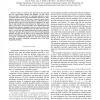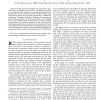104 search results - page 17 / 21 » Sensing-based opportunistic channel access |
CORR
2007
Springer
13 years 10 months ago
2007
Springer
— The fairness of IEEE 802.11 wireless networks (including Wireless LAN and Ad-hoc networks) is hard to predict and control because of the randomness and complexity of the MAC co...
WIOPT
2010
IEEE
13 years 9 months ago
2010
IEEE
—Cognitive radio networks provide the capability to share the wireless channel with licensed (primary) users in an opportunistic manner. Primary users have a license to operate i...
ICC
2007
IEEE
14 years 5 months ago
2007
IEEE
— There is a need for new spectrum access protocols that are opportunistic, flexible and efficient, yet fair. Game theory provides a framework for analyzing spectrum access, a ...
GLOBECOM
2009
IEEE
13 years 8 months ago
2009
IEEE
Maintaining fairness using weighting factors is a common approach in resource allocation. However, computing weighting factors for multiservice wireless networks is not trivial bec...
TWC
2010
13 years 5 months ago
2010
Abstract--In this paper we investigate the opportunistic spectrum access in temporal domain where a secondary user shares a radio channel with a primary user during the OFF period ...


